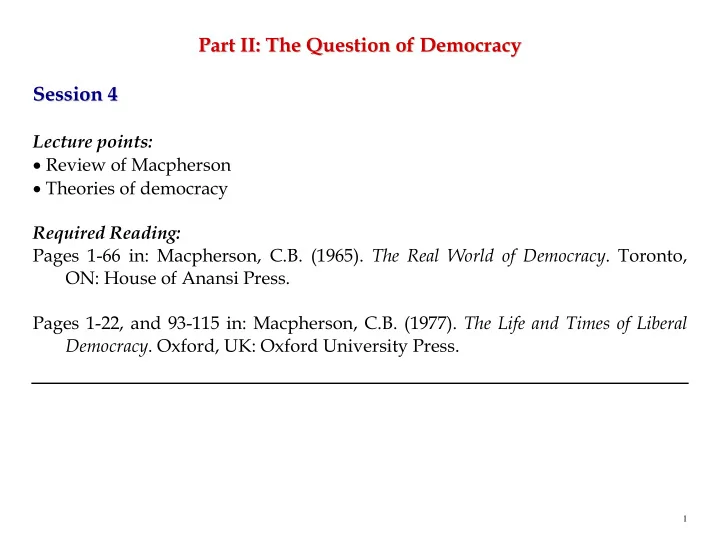

Pa ar rt t I II I: : T Th he e Q Qu ue es st ti io on n o of f D De em mo oc cr ra ac cy y P Se es ss si io on n 4 4 S Lecture points: • Review of Macpherson • Theories of democracy Required Reading: Pages 1-66 in: Macpherson, C.B. (1965). The Real World of Democracy . Toronto, ON: House of Anansi Press. Pages 1-22, and 93-115 in: Macpherson, C.B. (1977). The Life and Times of Liberal Democracy . Oxford, UK: Oxford University Press. 1
The Global Problems of “Democracy” � singular, universal, narrow, yet amorphous � Francis Fukuyama: Western liberal democracy has become “the final form of human government” (1992: xi) � Slavoj Zizek, some leftists were “patronizingly assuming that, for the backward Iranians, Ahmadinejad is good enough – they are not yet sufficiently mature to be ruled by a secular Left” (“Will the cat above the precipice fall down?” Slavoj Zizek on Iran—June 25, 2009) Some of the Particular Questions of “Democracy” 2
Democratic Elitism � Plato’s Republic � Thomas Hobbes � Niccolò Machiavelli � Samuel Rutherford: “No man cometh out of the womb with a diadem on his head , or a sceptre in his hand” � comte de Saint-Simon � Max Weber � Links: apathy � democracy � state � Gaetano Mosca and Vilfredo Pareto � Mosca, The Ruling Class: Elements of a Political Science (1896): “When we say that the voters ‘choose’ their representative, we are using a language that is very inexact. The truth is that the representative has himself elected by the voters” (p. 154) 3
� Joseph Schumpeter “Let us transport ourselves into a hypothetical country that, in a democratic way, practices the persecution of Christians, the burning of witches, and the slaughtering of Jews. We should certainly not approve of these practices on the ground that they have been decided on according to the rules of democratic procedure. But the crucial question is: would we approve of the democratic constitution itself that produced such results in preference to a non-democratic one that would avoid them?” � The “democratic method” then is: “that institutional arrangement for arriving at political decisions in which individuals acquire the power to decide by means of a competitive struggle for the people’s vote” � Schumpeter: “Democracy means only that the people have the opportunity of accepting or refusing the men who are to rule them” � Raymond Aron: “a society of the Soviet type and one of the Western type is that the former has a unified elite and the latter a divided elite” � Seymour Lipset’s “Working-Class Authoritarianism” 4
Macpherson, C.B. (1965). The Real World of Democracy . Toronto, ON: House of Anansi Press. [Pages 1-66] 1. What is “the real world of democracy”? 2. Who has a “genuine historical claim to the title [‘]democracy[‘]”? What makes it a “historical claim”? Why is it even important to ask this question? 3. Which socio-economic system necessarily underpins “liberal democracy”? 4. The liberal state and liberal society are to be distinguished from democracy and equality. Why? What defines the “liberal society”? 5. From “non-liberal democracy” Macpherson posits that “democracy” and “dictatorship” are not necessarily polar opposites. How does he explain that? 6. Note the distinction Macpherson draws between the “narrow” conception of democracy (a system of government), and the “broader” conception (a type of society). 5
7. How is the concept of democracy in many of the so-called newly “independent underdeveloped countries” (the “Third World”) different from either Marxist or capitalist ideas of democracy? Likewise, why is “strong political leadership” (what many in the West today would call “authoritarianism”) necessary ? 8. What makes the one-party state not just “apt” but “irresistible” in so many countries that have experienced revolutions against foreign rule? 9. Democracy as being about ends and as a producer ’s good. How does these qualities differ from liberal-democracy? 10. How is “liberal-democracy” a “system of power”? 6
Macpherson, C.B. (1977). The Life and Times of Liberal Democracy . Oxford, UK: Oxford University Press. [Pages 1-22, and 93-115] 1. Is liberal-democracy at an end? Why? 2. How is it justifiable to say that “a more equitable and humane society requires a more participatory political system”? 3. Can our system of government be made more participatory, and if so, how? 4. When Macpherson states that “electronic technology…cannot give us direct democracy,” is his conclusion shaped by the state of existing electronic technology of his time? 5. If, as Macpherson argues, there is a vicious circle—we need more equality to attract greater political participation, and greater participation to reduce inequality—then what are the three main “loopholes” in this circle that make participatory democracy more attainable? Do you agree? 6. What are the possibilities and limits of a possible participatory democracy? How would your “model” differ? 7
Recommend
More recommend